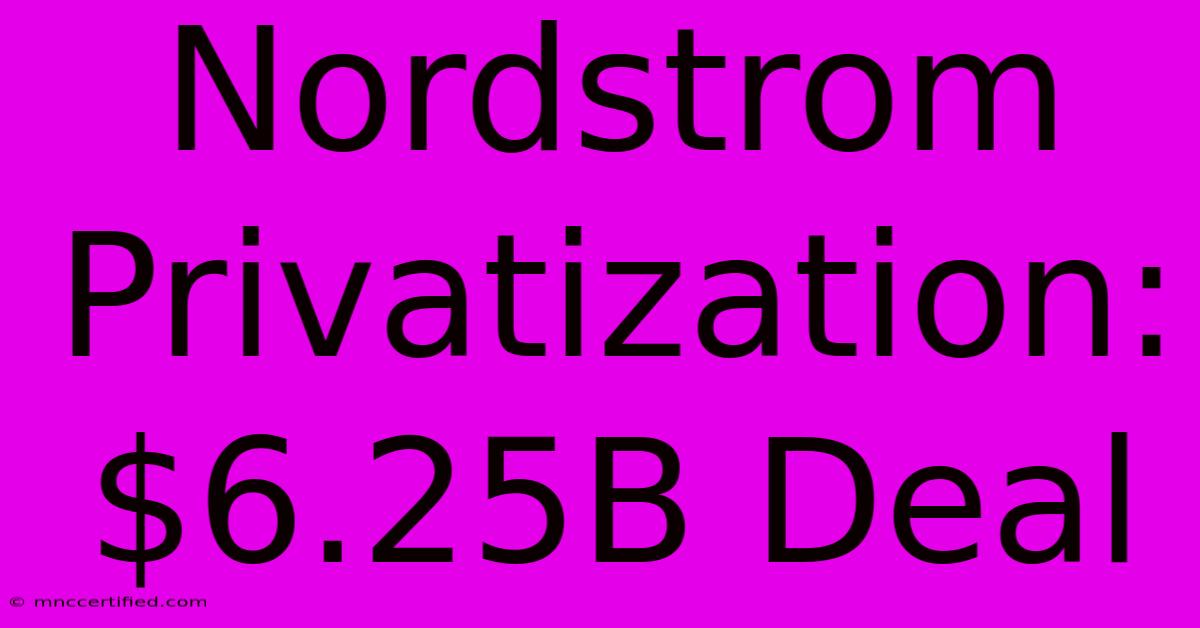Nordstrom Privatization: $6.25B Deal

Table of Contents
Nordstrom Privatization: A $6.25 Billion Deal Explained
Nordstrom, a prominent name in the American retail landscape, has officially gone private in a landmark deal valued at $6.25 billion. This significant transaction marks a major shift for the company and raises several key questions for investors, employees, and customers alike. This article will delve into the details of the privatization, exploring its implications and potential consequences.
Understanding the Nordstrom Privatization
The privatization was spearheaded by the Nordstrom family, who, through their holding company, acquired all outstanding shares not already under their control. This move effectively removes Nordstrom from the public stock market (NYSE: JWN), ending its decades-long presence as a publicly traded company. The deal concludes a complex process involving negotiations, regulatory approvals, and shareholder votes.
Key Players and Financials:
- The Nordstrom Family: The driving force behind the privatization, leveraging their existing stake to take the company private. This signifies a renewed commitment to the long-term vision for Nordstrom's future, free from the pressures of quarterly earnings reports.
- $6.25 Billion Valuation: This represents the total value assigned to the company, reflecting its assets, brand recognition, and future potential. This figure is significant within the retail sector and highlights the continuing value placed on Nordstrom's brand despite recent economic headwinds.
- Shareholder Approval: The deal hinged on securing sufficient shareholder approval, a testament to the careful planning and persuasive arguments presented by the Nordstrom family to justify the privatization's merits.
Reasons Behind the Privatization
Several factors likely contributed to the Nordstrom family's decision to take the company private. These include:
1. Long-Term Strategic Vision:
Privatization affords the Nordstrom family greater flexibility in implementing their long-term strategic vision. Freed from the constant scrutiny of public market investors and the pressure to deliver short-term gains, they can focus on initiatives that may yield results over a longer period. This could involve significant investments in digital transformation, supply chain optimization, or expansion into new markets.
2. Enhanced Operational Efficiency:
Being a private company may allow Nordstrom to streamline operations and reduce costs. The elimination of public company reporting requirements and related expenses can contribute to improved profitability. This newfound efficiency could be crucial in navigating the current challenging retail environment.
3. Increased Competitive Advantage:
By removing the constraints of public ownership, Nordstrom can pursue more aggressive strategies to enhance its competitive advantage. This could encompass bolder acquisitions, targeted investments in technology and innovation, or more agile responses to evolving consumer preferences.
Implications and Future Outlook
The privatization of Nordstrom presents both opportunities and challenges. While it offers the potential for improved long-term performance through strategic investments and operational efficiencies, it also removes the transparency and accountability associated with public company status.
Potential Benefits:
- Increased Innovation: Greater freedom to invest in research and development, leading to improved products and services.
- Enhanced Customer Experience: Focus on long-term customer relationships rather than short-term sales targets.
- Improved Employee Morale: A more stable and predictable environment for employees, potentially leading to increased productivity and retention.
Potential Challenges:
- Reduced Transparency: Loss of public scrutiny and reporting requirements could lead to concerns about accountability.
- Limited Access to Capital: Accessing funding for future growth and acquisitions may become more challenging without public market access.
- Potential for Increased Debt: The privatization deal may have involved significant debt financing, increasing financial risk.
Conclusion:
The Nordstrom privatization is a significant event in the retail industry. While the long-term implications remain to be seen, the Nordstrom family's commitment to the company's future suggests a potentially positive trajectory. However, careful monitoring of the company's performance and financial health will be crucial to assess the ultimate success of this major strategic move. The coming years will be critical in determining whether this privatization ultimately benefits Nordstrom, its employees, and its customers.

Thank you for visiting our website wich cover about Nordstrom Privatization: $6.25B Deal. We hope the information provided has been useful to you. Feel free to contact us if you have any questions or need further assistance. See you next time and dont miss to bookmark.
Featured Posts
-
Gaetz Sex Scandal Attorney General Link
Dec 24, 2024
-
Us Greenland Ownership Trumps Stance
Dec 24, 2024
-
Norads Santa Tracker Evolution
Dec 24, 2024
-
Watch Celtics Vs Magic Tonight
Dec 24, 2024
-
New Report On Sexual Misconduct Allegations
Dec 24, 2024